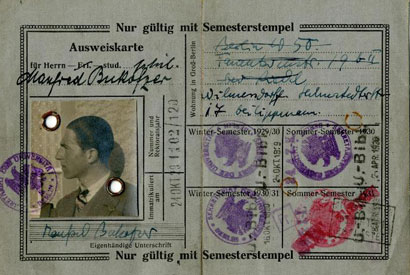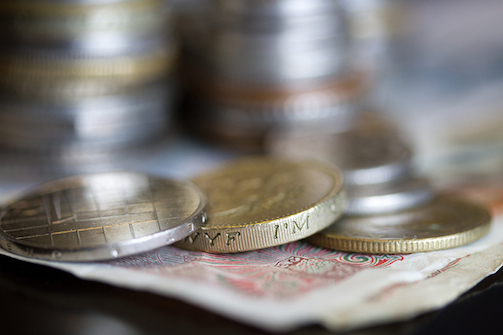
Road To Russia: Stockton biathlete ready for Sochi spectacular
February 6, 2014
Magnes exhibition explores intellectual migration from fascist Europe and rise …
February 6, 2014
–>
“The Member States of the EU are not immune to this reality. Corruption varies in nature and extent from one country to another, but it affects all Member States.” – European Union Anti-Corruption Report

Corruption isn’t unique to the EU. Photo: Jason Mrachina
It has become one of those curious organisations: sanctimonious yet delinquent; aspiring and failing. Riddled with ordinances, directives and suggestions about the rule of law, the European Union has found itself in another round of financial bother. Money speaks, and money has spoken rather loudly through the European Commission – to the tune of €120 billion. The EU Anti-Corruption Report, authored by the Commission to the Council and the European Parliament is filled with bureaucratic stodge (“Eurobarometer surveys” on perceptions of corruption, to take one example) and themes. It was clear, claimed EU Home Affairs Commissioner, Cecilia Malmstroem, that Europe lacked “corruption-free” zones.
In what is an at times painful read, the report suggests in contorted fashion that “Member States can be characterised in different ways” in terms of experiences over who gets bribed or who doesn’t. That is when the report gets interesting. Perceptions and prejudices, in various measures, combine to create a landscape of stringency, or laxness. “Answers confirm a positive perception and low experience of bribery in the case of Denmark, Finland, Luxembourg and Sweden.” In those countries, the expectation that a bribe had to be paid lay at less than 1 percent.
Perceptions, rather than hardboiled data, can prove precarious. Even the report’s discussion about the UK figures suggests how 5 out of 1115 were expected to pay a bribe, while “perception data show that 64 percent of UK respondents think corruption is widespread in the country (the EU average is 74 percent).” One can have perceptions of bad health and still be as fit as a fiddle. A high number of respondents registered experiences of bribery, but “with a clear concentration on a limited number of sectors.” These included Hungary, Slovakia and Poland. “In these countries, one sector, namely healthcare, provides the bulk of instances of bribery.”
Countries like Portugal, Slovenia, Spain and Italy again find themselves grappling with issues of perception: experiences of bribery were rare (1-3 percent) but the sense that everything was going to the dogs was rampant. In the longwinded words of the report, “the perception is so heavily influenced by recent political scandals and the financial and economic crisis that this is reflected in the respondents’ negative impression about the corruption situation overall.”
The gold standard of corruption, where perception and experience of it meet, included Croatia, the Czech Republic, Lithuania, Bulgaria, Romania and Greece. “In these countries, between 6 percent and 29 percent of respondents indicated that they were asked or expected to pay a bribe in the past 12 months, while 84 percent and up to 99 percent think that corruption is widespread in their country.”
The usual formula to such findings is one of well-coloured indignation. The conservative magazine, The Spectator, thought that European corruption, be it by index or country, was all rather straightforward: the EU is corrupt because southern Europe is corrupt. Even the anti-corruption report should refute that suggestion, given that Lithuania and the Czech Republic are hardly Bulgaria or Greece.
But that poor grasp of geography did not deter speculation on the part of the magazine’s Ed West, who seemed more obsessed with his own perceptions about clubs and appropriate membership. The short of it: those poorer states are simply not up to scratch and should stay out of the EU. “I don’t object to Romanian and Bulgarian EU citizens being able to come to Britain as such, I object to the very idea of these countries joining the polity of which I am a member.” Well it is you might like some people, but you just would not want to share the same bed or bank accounts with them. After all, “corruption levels are a reflection of public morality.”
There is always the usual hectoring tone that accompanies matters of money. The thrifty will always be the ones lecturing those who should know better, thinking that one household’s finances should accord with those of another’s. The industrialised states have simply developed different forms of corruption, ways of checking the rot, and redistributing it elsewhere.
Take the UK, who received a considerable ticking off in the report regarding donations to political parties and electoral campaign spending. While corruption is endemic across the EU, particular countries just do it in a different way. Perception indices tend to be futile, because the expectations of how things are done vary. Besides, the greater the number of rotten apples in a barrel, the greater the likelihood the fresh ones are at fault.
Having a clear, European-wide approach to this is distinctly challenging. The report’s discussion on liability of elected officials is one such illustration. “A fundamental challenge regarding anti-corruption policies is the lack of a harmonised definition of ‘public official’ at EU level which would include elected officials.” Indeed – for in an environment where public officials dabble with private ventures, “corruption” is bound to happen.
The problem with such conduct is that it makes a smooth running, united Europe an even harder sell. Corruption is all relative – and the European Commission itself can hardly be spared the scrutiny and scolding that it has given the EU states. The distance between the gravy train on the one hand, and the EU citizen on the other, was vast to begin with. It now seems like a gaping chasm.




